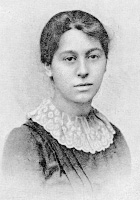A March Day In London Poem by Amy Levy
A March Day In London
The east wind blows in the street to-day;
The sky is blue, yet the town looks grey.
'Tis the wind of ice, the wind of fire,
Of cold despair and of hot desire,
Which chills the flesh to aches and pains,
And sends a fever through all the veins.
From end to end, with aimless feet,
All day long have I paced the street.
My limbs are weary, but in my breast
Stirs the goad of a mad unrest.
I would give anything to stay
The little wheel that turns in my brain;
The little wheel that turns all day,
That turns all night with might and main.
What is the thing I fear, and why?
Nay, but the world is all awry--
The wind's in the east, the sun's in the sky.
The gas-lamps gleam in a golden line;
The ruby lights of the hansoms shine,
Glance, and flicker like fire-flies bright;
The wind has fallen with the night,
And once again the town seems fair
Thwart the mist that hangs i' the air.
And o'er, at last, my spirit steals
A weary peace ; peace that conceals
Within its inner depths the grain
Of hopes that yet shall flower again.
I have not heard of Amy Levy in my reading of many poetry collections and anthologies. Her biography in the PH web-site is very interesting. She has described the London scenes of the 19th century well. Her verse is patterned and conventional, but worth this recall. I wonder what she made of her association with Karl Marx's family. Sad she was so depressed and died young.
Of hot desire! With the muse of an occasion. Nice work.
Lovely descriptions cause the reader to feel almost as though they were present in the scene she poetically paints.
Beautiful poem having touching expression. I appreciate this poem very much.
A moment frozen in time, I can almost smell it. I think I know what her fear was but there is no clue in this verse.
Such beautiful write. Instantaneous brings peace to weary heart.
From unrest in grey misty town - to peace and hope. The rhythmic pace of a poem is very dynamic and bold.
This poem has not been translated into any other language yet.
I would like to translate this poem
'The wind's in the east, the sun's in the sky. The gas-lamps gleam in a golden line; The ruby lights of the hansoms shine, Glance, and flicker like fire-flies bright; ' Interesting lines embedded with a glimpse into a past age! 'From end to end, with aimless feet, All day long have I paced the street.' I wonder why she spent such a tiring day out, without identifying the exact reason, the lines 'My limbs are weary, but in my breast Stirs the goad of a mad unrest.' These lines remind of Edgar Alan Poe, and it seems all is not well with the 'little wheel' turning in her brain. The first stanza seems to indicate a missed meeting, the tempest of love, with the blue sky yet she if the lover, sees a grey town; with the word images of 'the wind of ice' and 'cold despair' contrasted with 'wind of fire' and 'hot desire'. 'The sky is blue, yet the town looks grey. 'Tis the wind of ice, the wind of fire, Of cold despair and of hot desire, Which chills the flesh to aches and pains, And sends a fever through all the veins.' The second stanza is images of tired exhaustion, yet the weary limbs are dominated by the heart, or a breast of mad unrest, and the fifth line in this stanza 'I would give anything to stay', because a wheel of love is turning dominating her thoughts and emotions day and night? The third stanza contains beautiful romantic images of night and suddenly despite her exhaustion, the grey looking town seems fair with mist in the air. Mist can hide a lover's meeting and 'And o'er, at last, my spirit steals A weary peace; peace that conceals' seems to hint at such a meeting. The last two lines still in the mist 'Within its inner depths the grain/ Of hopes that yet shall flower again' indicates that with a hidden meeting the lovers have reclaimed a measure of hope in their future. One interesting reading among many, what is unsaid hides behind the lines with ambiguous hints which intrigue.